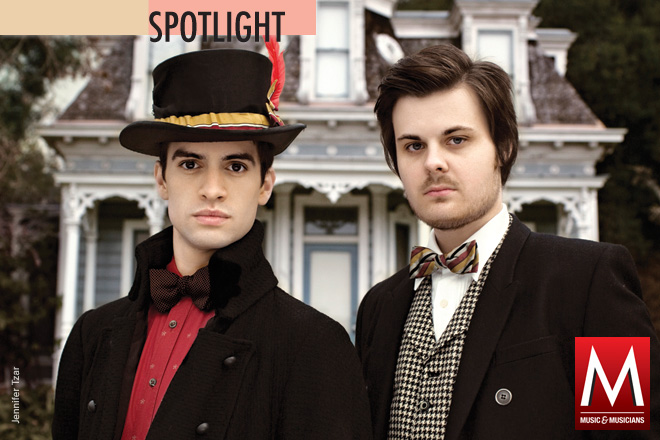PANIC! AT THE DISCO
No need for alarm—the synth-popsters have returned to the dance floor
When Panic! At the Disco announced in July 2009 that it was reinserting the exclamation point it had dropped from its name the previous year, there were two ways to read the news. One: The Las Vegas band really was panicking. This would have been understandable, given that bassist Jon Walker and guitarist and primary lyricist Ryan Ross had just quit, leaving singer-guitarist Brendon Urie and drummer Spencer Smith to carry on as a duo. Fortunately, the other, more optimistic interpretation—that Urie and Smith were starting fresh and affirming that one of the decade’s most successful rock groups wasn’t finished—turned out to be correct. The proof came in March, when Panic! At the Disco released the long-awaited Vices & Virtues, the band’s third album and its first written entirely by Urie and Smith. “It definitely took some time to figure out exactly what we wanted to do,” Smith acknowledges. “Even though it was still Panic, it felt like a new band.”
Working with producers John Feldmann and Butch Walker, Urie and Smith struggled to find their sound—but they did know they wanted to recapture the spirit of their debut, 2005’s multiplatinum A Fever You Can’t Sweat Out. Smith recalls that in the group’s early days, the members felt a sense of musical freedom. They paired punk guitars and pop melodies with synthesizer licks and dance beats, never thinking their hyperactive, hyper-emotional sound would help define alternative rock for the MySpace era. “On our first record, that was the mentality: Anything was allowed,” Smith says. “There was no pressure. Any musical style was possible.”
On its follow-up, the band opted for what Smith calls a more “confined” approach, allowing their budding enthusiasm for ’60s psychedelic rock to lead them down the rabbit hole of Pretty. Odd., a Sgt. Pepper-style concept record. Vices & Virtues retains some of those retro elements, but Urie and Smith mostly dust off the synths and deliver gigantic arena-emo choruses like the one heard on the lead single “The Ballad of Mona Lisa.” “One album got it out of our system,” Smith says. “We were still 20-somethings, and we were naturally going through the changes that you go through, finding new bands and new music you get really excited about. It’s gotten to a point where we’re not changing as drastically or as quickly.”
–Kenneth Partridge




comment closed